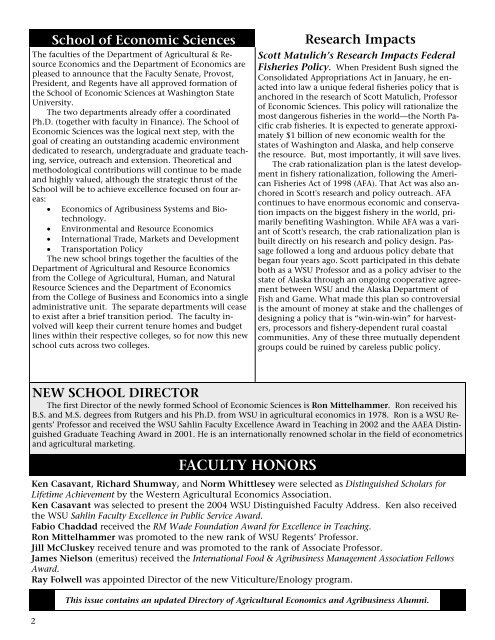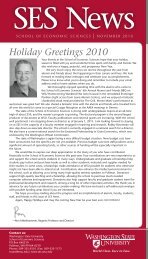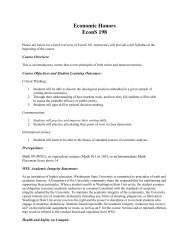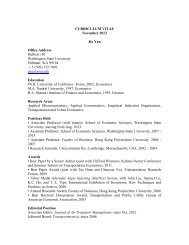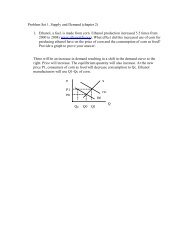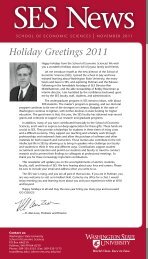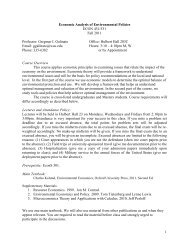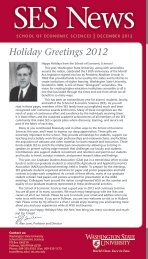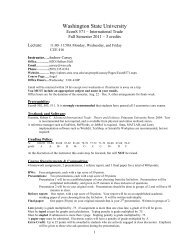AREcho Summer 2004 - College of Agricultural, Human, and ...
AREcho Summer 2004 - College of Agricultural, Human, and ...
AREcho Summer 2004 - College of Agricultural, Human, and ...
Create successful ePaper yourself
Turn your PDF publications into a flip-book with our unique Google optimized e-Paper software.
School <strong>of</strong> Economic Sciences<br />
The faculties <strong>of</strong> the Department <strong>of</strong> <strong>Agricultural</strong> & Resource<br />
Economics <strong>and</strong> the Department <strong>of</strong> Economics are<br />
pleased to announce that the Faculty Senate, Provost,<br />
President, <strong>and</strong> Regents have all approved formation <strong>of</strong><br />
the School <strong>of</strong> Economic Sciences at Washington State<br />
University.<br />
The two departments already <strong>of</strong>fer a coordinated<br />
Ph.D. (together with faculty in Finance). The School <strong>of</strong><br />
Economic Sciences was the logical next step, with the<br />
goal <strong>of</strong> creating an outst<strong>and</strong>ing academic environment<br />
dedicated to research, undergraduate <strong>and</strong> graduate teaching,<br />
service, outreach <strong>and</strong> extension. Theoretical <strong>and</strong><br />
methodological contributions will continue to be made<br />
<strong>and</strong> highly valued, although the strategic thrust <strong>of</strong> the<br />
School will be to achieve excellence focused on four areas:<br />
�� Economics <strong>of</strong> Agribusiness Systems <strong>and</strong> Biotechnology.<br />
�� Environmental <strong>and</strong> Resource Economics<br />
�� International Trade, Markets <strong>and</strong> Development<br />
�� Transportation Policy<br />
The new school brings together the faculties <strong>of</strong> the<br />
Department <strong>of</strong> <strong>Agricultural</strong> <strong>and</strong> Resource Economics<br />
from the <strong>College</strong> <strong>of</strong> <strong>Agricultural</strong>, <strong>Human</strong>, <strong>and</strong> Natural<br />
Resource Sciences <strong>and</strong> the Department <strong>of</strong> Economics<br />
from the <strong>College</strong> <strong>of</strong> Business <strong>and</strong> Economics into a single<br />
administrative unit. The separate departments will cease<br />
to exist after a brief transition period. The faculty involved<br />
will keep their current tenure homes <strong>and</strong> budget<br />
lines within their respective colleges, so for now this new<br />
school cuts across two colleges.<br />
Research Impacts<br />
Scott Matulich’s Research Impacts Federal<br />
Fisheries Policy. When President Bush signed the<br />
Consolidated Appropriations Act in January, he enacted<br />
into law a unique federal fisheries policy that is<br />
anchored in the research <strong>of</strong> Scott Matulich, Pr<strong>of</strong>essor<br />
<strong>of</strong> Economic Sciences. This policy will rationalize the<br />
most dangerous fisheries in the world—the North Pacific<br />
crab fisheries. It is expected to generate approximately<br />
$1 billion <strong>of</strong> new economic wealth for the<br />
states <strong>of</strong> Washington <strong>and</strong> Alaska, <strong>and</strong> help conserve<br />
the resource. But, most importantly, it will save lives.�<br />
� The crab rationalization plan is the latest development<br />
in fishery rationalization, following the American<br />
Fisheries Act <strong>of</strong> 1998 (AFA). That Act was also anchored<br />
in Scott's research <strong>and</strong> policy outreach. AFA<br />
continues to have enormous economic <strong>and</strong> conservation<br />
impacts on the biggest fishery in the world, primarily<br />
benefiting Washington. While AFA was a variant<br />
<strong>of</strong> Scott's research, the crab rationalization plan is<br />
built directly on his research <strong>and</strong> policy design. Passage<br />
followed a long <strong>and</strong> arduous policy debate that<br />
began four years ago. Scott participated in this debate<br />
both as a WSU Pr<strong>of</strong>essor <strong>and</strong> as a policy adviser to the<br />
state <strong>of</strong> Alaska through an ongoing cooperative agreement<br />
between WSU <strong>and</strong> the Alaska Department <strong>of</strong><br />
Fish <strong>and</strong> Game. What made this plan so controversial<br />
is the amount <strong>of</strong> money at stake <strong>and</strong> the challenges <strong>of</strong><br />
designing a policy that is “win-win-win” for harvesters,<br />
processors <strong>and</strong> fishery-dependent rural coastal<br />
communities. Any <strong>of</strong> these three mutually dependent<br />
groups could be ruined by careless public policy.<br />
NEW SCHOOL DIRECTOR<br />
The first Director <strong>of</strong> the newly formed School <strong>of</strong> Economic Sciences is Ron Mittelhammer. Ron received his<br />
B.S. <strong>and</strong> M.S. degrees from Rutgers <strong>and</strong> his Ph.D. from WSU in agricultural economics in 1978. Ron is a WSU Regents’<br />
Pr<strong>of</strong>essor <strong>and</strong> received the WSU Sahlin Faculty Excellence Award in Teaching in 2002 <strong>and</strong> the AAEA Distinguished<br />
Graduate Teaching Award in 2001. He is an internationally renowned scholar in the field <strong>of</strong> econometrics<br />
<strong>and</strong> agricultural marketing.<br />
FACULTY HONORS<br />
Ken Casavant, Richard Shumway, <strong>and</strong> Norm Whittlesey were selected as Distinguished Scholars for<br />
Lifetime Achievement by the Western <strong>Agricultural</strong> Economics Association.<br />
Ken Casavant was selected to present the <strong>2004</strong> WSU Distinguished Faculty Address. Ken also received<br />
the WSU Sahlin Faculty Excellence in Public Service Award.<br />
Fabio Chaddad received the RM Wade Foundation Award for Excellence in Teaching.<br />
Ron Mittelhammer was promoted to the new rank <strong>of</strong> WSU Regents’ Pr<strong>of</strong>essor.<br />
Jill McCluskey received tenure <strong>and</strong> was promoted to the rank <strong>of</strong> Associate Pr<strong>of</strong>essor.<br />
James Nielson (emeritus) received the International Food & Agribusiness Management Association Fellows<br />
Award.<br />
Ray Folwell was appointed Director <strong>of</strong> the new Viticulture/Enology program.<br />
2<br />
This issue contains an updated Directory <strong>of</strong> <strong>Agricultural</strong> Economics <strong>and</strong> Agribusiness Alumni.


